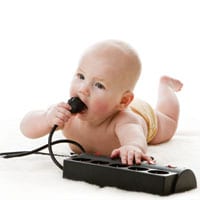Having a baby is a busy time – not only is your body changing rapidly, you have to start adapting your life and home for your new addition. Right after looking after yourself, the top priority is making sure your home is a safe and welcoming place.
Baby proofing
Before you bring your baby home, make sure you have taken a critical look at your home. Is it safe for children? You may be surprised how many things, which are fine for adults, can pose a risk to children.
- Remove all choking hazards within a child’s reach such as small toys, coins, paper clips and even small hard foods such as peanuts. Anything babies can put in their mouth, they will!
- If you have stairs, put in baby gates top and bottom. Keep them closed at all times.
- Make sure all heavy, movable items such as bookcases are anchored to the wall. As children become more mobile, they could easily knock them over as they pull themselves up to stand or just toddle past.
- All medicines, chemicals, cleaning supplies and alcohol should be stored up high in a locked cabinet.
- Keep appliance cords well out of reach so children cannot accidentally pull them on top of themselves.
- If you have a pool or spa, install a fence at least five feet high that goes all the way around it. When children are in or near water, including the bath, an adult should supervise carefully at all times.
Fire safety
According to the US Fire Administration, children under the age of 5 are twice as likely to die in a fire than the rest of us. Follow these procedures in your home to prevent such a tragedy in your family:
- Be prepared: have a detailed escape plan so you don’t panic if there is a fire. Practice it with your family at least twice a year.
- Store matches, lighters and other fire starters away from children at all times.
- Buy and maintain working smoke alarms. These will help you get out of your house quickly in case of a fire. Put one on each floor of your home, including inside your baby’s room. Test the batteries monthly and replace them once a year.
Did you know?
The Home Safety Council website helps you create a personalized home safety checklist at homesafetycouncil.org
If you think someone has been poisoned, call the Poison Help line, 1800.222.1222






Comments are closed.